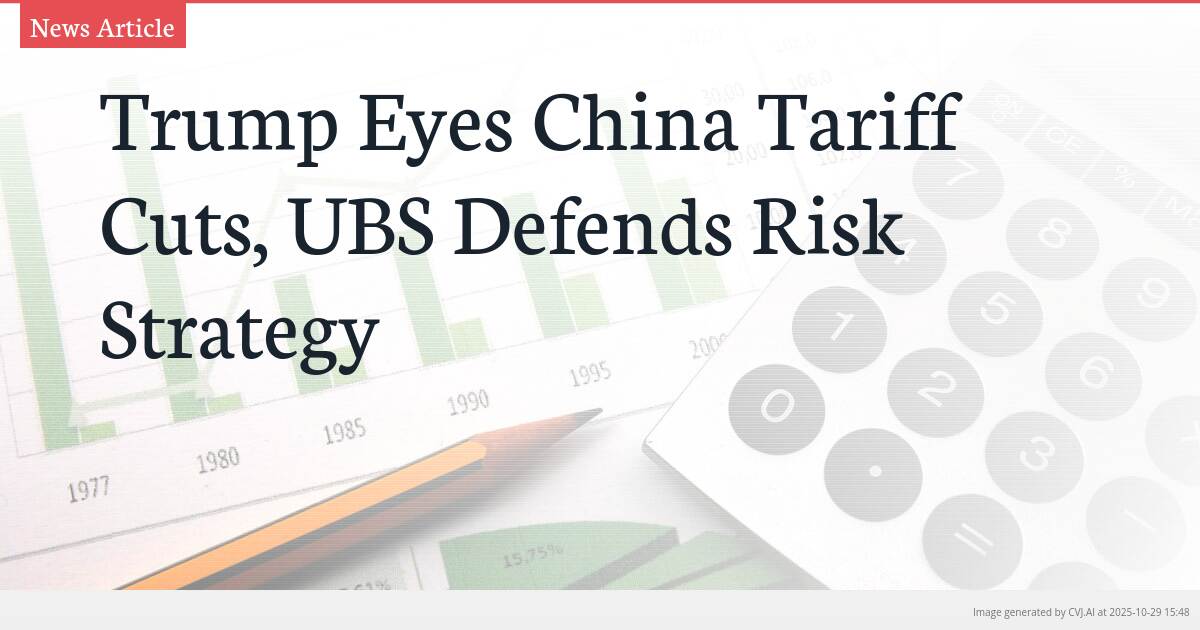This summary text is fully AI-generated and may therefore contain errors or be incomplete.
Introduction
Former President Donald Trump has signaled potential reductions to US tariffs on Chinese goods while planning discussions about Nvidia’s advanced AI technology with Chinese President Xi Jinping, as global leaders work to ease economic tensions. Meanwhile, UBS Group CEO Sergio Ermotti has defended the bank’s exposure to bankrupt auto parts supplier First Brands, emphasizing that investors were fully aware they were participating in higher-risk investment strategies. These developments highlight the complex interplay between international trade diplomacy and financial institution risk management in today’s volatile market environment.
Key Points
- Trump considers reducing China tariffs tied to fentanyl crisis while planning Xi Jinping talks about Nvidia's Blackwell AI chip
- UBS CEO defends bank's exposure to bankrupt First Brands, emphasizing investor awareness of higher-risk strategies
- Global economic leaders seek to de-escalate trade tensions amid ongoing market volatility and risk management challenges
Trump's Dual-Track Approach to US-China Relations
Donald Trump’s announcement regarding potential tariff reductions on Chinese goods represents a significant shift in the ongoing trade relationship between the world’s two largest economies. The former president specifically linked these potential reductions to the fentanyl crisis, indicating that trade policy is being used as leverage in broader geopolitical negotiations. This approach marks a departure from the more confrontational trade policies that characterized much of the previous administration’s stance toward China.
Simultaneously, Trump’s planned discussion with Chinese President Xi Jinping about Nvidia’s flagship Blackwell artificial intelligence chip underscores the growing importance of technology in international relations. The Blackwell chip represents cutting-edge AI technology that has become a strategic asset in the global technology race. By placing this topic on the diplomatic agenda, Trump is acknowledging both the competitive and cooperative dimensions of the US-China technology relationship, where American companies like Nvidia operate within a complex framework of export controls and market opportunities.
The timing of these developments, as leaders of the world’s biggest economies seek to ease tensions in their Thursday meeting, suggests a potential thaw in economic relations. This diplomatic engagement comes at a critical juncture for global markets, which have been navigating the challenges of supply chain disruptions, inflationary pressures, and technological competition between the two economic superpowers.
UBS's Defense of Higher-Risk Investment Strategies
In a separate development with significant implications for financial markets, UBS Group Chief Executive Officer Sergio Ermotti has mounted a robust defense of his bank’s exposure to bankrupt auto parts supplier First Brands. The CEO’s comments come amid growing scrutiny of financial institutions’ risk management practices in an environment of increasing economic uncertainty. Ermotti’s central argument—that investors were fully aware they were engaged in higher-risk strategies—speaks to broader questions about transparency and responsibility in modern banking.
The First Brands bankruptcy represents exactly the type of corporate failure that tests the resilience of major financial institutions like UBS. By publicly addressing the criticism, Ermotti is attempting to draw a clear distinction between unexpected losses and calculated risks that were properly disclosed to investors. This defense strategy reflects the delicate balance that global banks must maintain between pursuing profitable opportunities and managing their risk exposure in volatile market conditions.
Ermotti’s statement also highlights the ongoing challenges facing European financial institutions as they navigate post-pandemic economic realities. The auto parts sector has been particularly vulnerable to supply chain disruptions and shifting consumer demand patterns, making investments in companies like First Brands inherently risky. UBS’s position in this situation will likely be closely watched by regulators and investors alike as a test case for how major banks communicate and manage risk in their investment portfolios.
Market Implications and Broader Economic Context
The convergence of these two stories—Trump’s trade diplomacy and UBS’s risk management challenges—illustrates the interconnected nature of modern global finance. Trade policy decisions between the United States and China have direct implications for corporate profitability, supply chain stability, and ultimately, the creditworthiness of companies operating in affected sectors. For financial institutions like UBS, these macroeconomic developments create both opportunities and risks that must be carefully managed.
The focus on Nvidia’s Blackwell AI chip in US-China discussions underscores how technological competition has become central to economic diplomacy. As AI technology continues to advance, companies like Nvidia find themselves at the intersection of commercial opportunity and national security concerns. The outcome of discussions between Trump and Xi Jinping could have significant implications for how American technology companies access international markets and collaborate across borders.
Meanwhile, the UBS-First Brands situation serves as a reminder that even as global leaders work to reduce macroeconomic tensions, individual corporate failures continue to pose challenges for financial institutions. The bank’s defense of its risk management practices reflects the ongoing tension between the pursuit of returns in a low-yield environment and the need for prudent risk assessment. As markets continue to navigate uncertain economic conditions, the ability of financial institutions to clearly communicate their risk exposure and management strategies will remain critical to maintaining investor confidence.
📎 Read the original article on bloomberg.com

